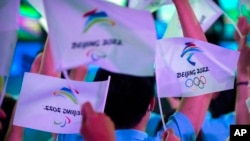Here is a summary of Uyghur-related news around the world in the past week.
Marriott declined to host international Uyghur conference in Prague
Marriott turned down a conference of Uyghur human rights activists held in Prague. “For reasons of political neutrality, we cannot offer events of this type with a political theme,” the hotel told the organizers, according to an Axios report. Marriott later said it would apologize and that “the hotel’s response was not consistent with our policies."
Chinese YouTuber secretly recorded internment camps in Xinjiang
A Chinese YouTuber secretly recorded a 20-minute video that documented what one researcher described as “some of the largest and most infamous” internment camps in Xinjiang. Human rights groups estimate more than 1 million Uyghurs have been arbitrarily detained there, though Beijing describes the camps as “vocational training schools.”
US considering diplomatic boycott of 2022 Winter Olympics in Beijing
Jen Psaki, the White House press secretary, said last week that the U.S. was considering a diplomatic boycott of the 2022 Beijing Winter Olympics because of “serious concerns” about human rights abuses in Xinjiang.
Uyghur activists ask Canada to block imports made with forced Uyghur labor and take in more refugees
Dolkun Isa, the leader of World Uyghur Congress, is asking Ottawa to block imports of goods made with forced labor of Uyghurs in China and to admit more Uyghur refugees fleeing China’s persecution.
Japanese apparel makers stop sourcing cotton from Xinjiang over allegations of forced Uyghur labor
Japan apparel makers Sanyo Shokai and TSI holdings have decided to stop sourcing cotton from China’s Xinjiang region, joining other Japanese and international manufacturers over allegations of forced Uyghur labor, while other brands continue using cotton from the region because they “have been unable to confirm the problem.”
News in brief
— The South China Morning Post reports the European Union will renew sanctions against four top Chinese officials in Xinjiang and one government office for their alleged role in human rights abuses toward Uyghurs and other Turkic ethnic groups in Xinjiang. The renewed sanctions are expected to be approved at the beginning of December and “roll over” in March 2022, which will mark a year after the original sanctions were put in place.
— More than 100 global brands are at risk of selling cotton products related to forced Uyghur labor in Xinjiang where China’s cotton industry obscures where the cotton originated, according to a report last week. The report, Laundering Cotton, How Xinjiang Cotton Obscured in International Supply Chains, by the Helena Kennedy Center for International Justice at Sheffield Hallam University in England, found that Chinese yarn and fabric suppliers that use cotton from the Uyghur region would export their semi-finished cotton products to intermediary manufacturers that then ship finished products to brands worldwide, including the U.S.
Quote of note
“They [local authorities] compel people — sometimes whole villages — to relinquish the leases to their land … and then they [Uyghurs] are considered ‘surplus labor’ by the government and are made more vulnerable to state-sponsored labor transfers.” — Laura Murphy, lead author of Laundering Cotton, How Xinjiang Cotton Obscured in International Supply Chains, and professor of human rights and contemporary slavery at Sheffield Hallam University in England.




